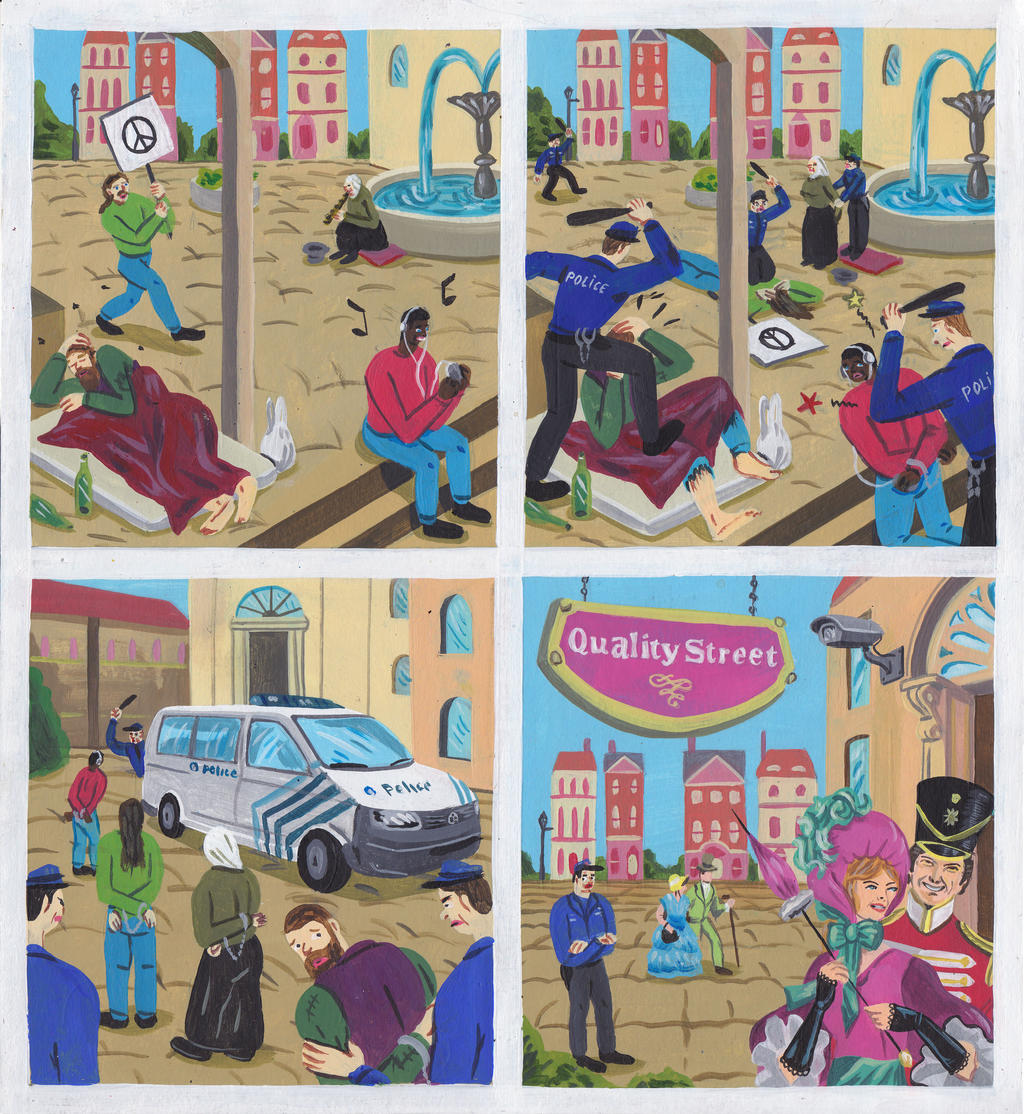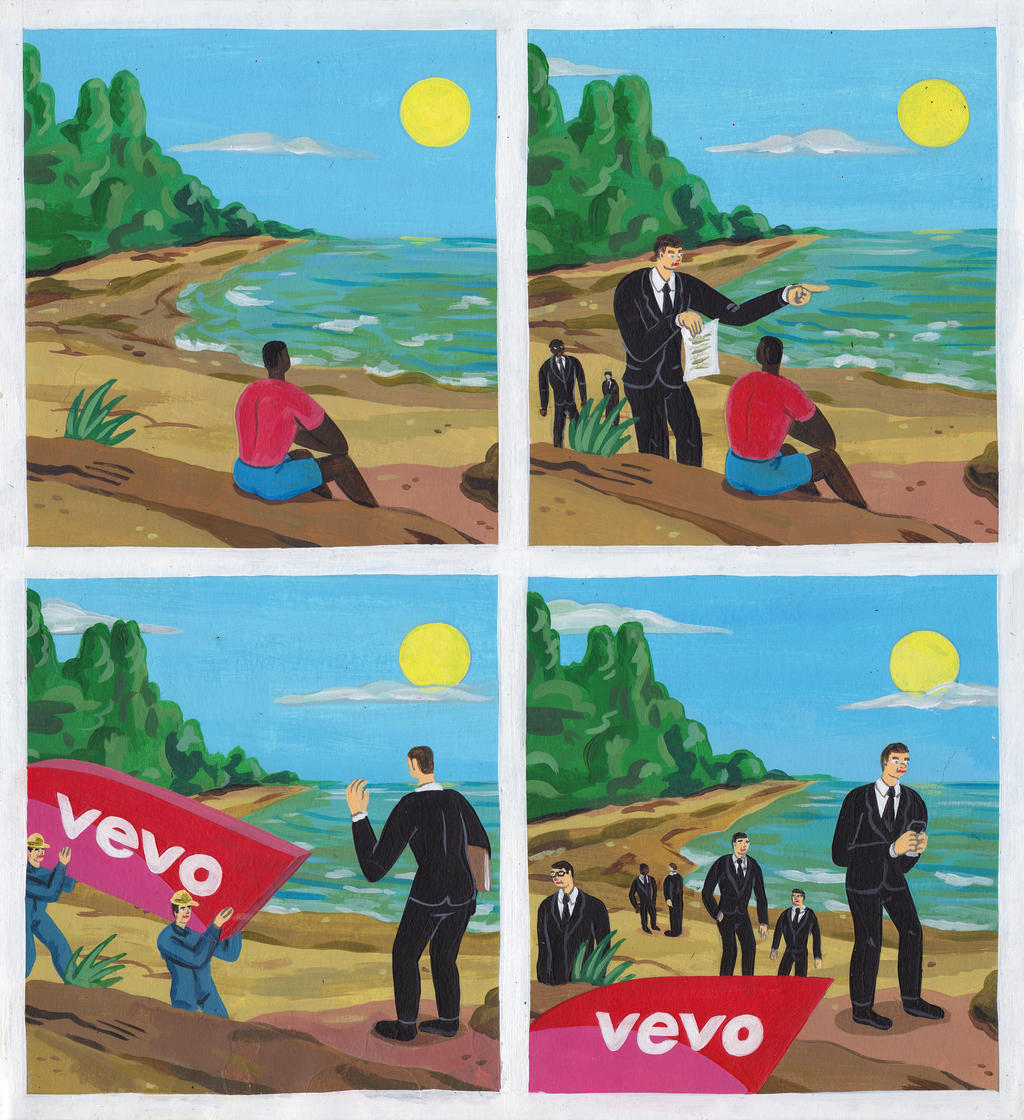
BRECHT VANDENBROUCKE
fight the powers that be

You know that you’ve entered the universe of Belgian artist and illustrator Brecht Vandenbroucke, when self-proclaimed (and rather threadbare) art critics are giving you two thumbs down and homeless guys as well as immigrants are forced to abandon the comic strip in order to adhere to law and order of a clean-cut society. Inspired by peers such as David Shrigley, Charlotte Solomon and Mark Beyer, Vandenbroucke’s view of the world is a deliciously ill-natured one, where every attempt to live your life peaceful, ambitious and individual are doomed to fail due to the complex chaos that’s surrounding us everyday.
Lodown took the opportunity to sit down with the Gent based artist at his solo show at Berlin’s Epicentro Art during last year's Pictoplasma festival.
You got invited to Berlin last year to join the International Literature Festival where you introduced your graphic novel “White Cube“, and now you’re here for the Pictoplasma festival. Do you see a major difference between these two platforms or is it basically a quite similar audience?
It’s a different audience, but it’s equally as interesting. I think I got invited for both festivals because my work is a bit hard to pin down... plus I’m basically loving all the many different facets connected to culture. For me there is no difference between pop culture and so-called underground culture. I wasn’t necessarily looking for a specific audience with my work... the audience found me, so to speak. Me, I’m just doing what I like to do.
Pictoplasma though is strongly connected to figurative character based design work… I wouldn’t necessary say that you are the perfect fit for it, you know what I mean?
I do have my own characters and I do have my own design in a certain way the thing is, my work is narrative so its with ideas its not about the form because it’s first the idea then the form. The form follows the ideas. I love the diversity the festival has cultivated by now. There’s people doing toys, there’s people doing street art, there’s people doing things for galleries, there´s illustrations, comics, animation. I do have my own characters and I do have my own way to portray them... but my work is first and foremost connected to a strong narrative side, so form is always following the ideas I have. But I know what you mean, my characters need a narrative, they need a world of their own… they need a setting, because it´s mainly about tension and different conflicts in my work. If you would isolate one character from this world, it wouldn’t be too interesting, really. I don’t do any big jobs in terms of commissioned work, so the festival is a good platform for me top meet other artists and expand my audience.
There are a lot of 90s references in your work. Would you say it’s a really personal world that you create before you then transform it into this kind of surreal universe?
I was born in 1986, so, yes, I grew up during the 90s... even though I discovered a lot of these typical 90s pop culture milestones later in my life. I don’t try to express myself in my work, it isn’t really about me. It’s about the world we live in and about the tensions between people.
Would you then say that your work is informed by growing up in Belgium?
Well, I grew up with Belgian comics and I think somehow their influence can be seen in my work, even though the majority of it happened rather subconsciously. I mean, in the end, you can’t help it, you’re always the child of the time and the place you grew up with, right? In my case: my parents are farmers. I didn’t grew up in the city. And I have four brothers and we all lived isolated... and strangely all of us were drawing all the time. Pop culture was really important for me. All of sudden we had a television and it was like a whole new thing. It was like the outside world invading my life... it made my world a lot bigger. There was no art in my home. I don’t come from a cultural background. And then I went to Art School where you learn all this new things about performance artists and whatnot, which I’ve never heard about... so I reflect a lot about those things in my book .
In which area of Belgium did you grow up?
On a farm in Veurne, which is pretty close to the French border. It’s near the sea, and you’re surrounded by seemingly endless fields. It’s a weird place that seems to be a bit removed from time. I then studied illustration in Gent at Saint Lucas for four years. Belgium is a weird place, is feels like a weird construction that never got finished, we have two languages and whatnot… I guess, that’s why I always work in English. I want everyone to understand my work.
You are fairly new to that whole scene, so would you say that living in this digital age of here and now significantly helped you to get your name out there?
Definitely. I mean, I’m also working as an illustrator and I never had to knock on doors in order to ask if it would be alright to show my portfolio. It’s online and people find out about it and that’s how I get jobs. It keeps falling that way because people discovered me. I obviously know that the Internet can be a double-edged sword as well, and that´s why I use it as a topic in my work quite often, I guess. You upload a single new image one day, and the next day it can be everywhere... so you better be sure about what you want to say with your work because everyone is judging you. You put something weird in your work and the knifes are out, right?!I mean, I don’t read the feedback too often. I don’t really care. That’s the whole point of my graphic novel “White Cube“. The two protagonists are exactly alike and they are opinionated about everything. They are aesthetics critics, and they either give thumps up or they don’t like the work and then they destroy it. And I realized that too many people actually just do that, they tend to copy/paste opinions... it’s just thin air. It’s not important. It doesn't mean anything because it’s just an echo of an opinion.
I had this discussion with a fellow artist the other day. People all of a sudden have this idea of being opinionated just because they wrote a sentence in the comment section... but this hardly can be seen as criticism.
No, not at all. It’s light. The majority is just copying a wannabe brainy quote from someone else. I don’t think the discussion should be on the internet because you don’t know the people’s background or where they come from. It’s like walking a mile in another person’s shoes, don’t you think?
Another very relevant thing about your work is that you’re not shying away from an often biting social commentary.
I’m not necessarily trying to deliver a message or anything. Again, it’s more about playing around with certain codes and pushing boundaries. Just lately I’m really enjoying making jokes about big companies like Apple and Vevo, for example. I want to make work that is progressive and I want to embrace it... and at he same time it’s critical because I simply don’t like how big companies invade your privacy and treat people like numbers. I don’t care if people think it’s pretentious crap... you know, if I’m not going to do it maybe no one else would.
Is this connected to your work being completely analog... I guess that’s hardly a coincidence, right?
It is old school, yes. The thing is, I cannot draw with computers because I didn’t learn it when I grew up... and learning it now would take me too long. I can manage it with brushes and paint, so why would I? I’m not against working digitally, it’s just that I’m not good at it. I know people who would do really amazing things with computers, but in the end it doesn’t really matter if you don’t have anything significant to tell. (laughs) Oh, and it’s easier for me to do gallery shows, because everything I draw or paint is an original and it basically can be put on the wall immediately. But then again, in the long run, how long can a drawing actually exist? These days probably not for too long if you don’t digitalize it sooner or later.
brechtvandenbroucke.blogspot.de
“White Cube“ was published by Avent Verlag in September 2013
words: Forty









